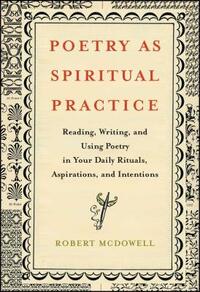Take a photo of a barcode or cover
It was fun, in it's own way. And some of the book had good verse in it. But it wasn't what I was expecting, or hoping for.
There was a lot of it which was dedicated to teaching the very formal verse styles that aren't commonly used any more. And there wasn't as much about the spiritual nature of poetry, and one might expect from a book with such a title. I guess the worst of it was how many of the exercises didn't really have any introspection or good contemplation. . . (my own opinion, of course).
But it did get a few poems out of me. I'm grateful for that.
There was a lot of it which was dedicated to teaching the very formal verse styles that aren't commonly used any more. And there wasn't as much about the spiritual nature of poetry, and one might expect from a book with such a title. I guess the worst of it was how many of the exercises didn't really have any introspection or good contemplation. . . (my own opinion, of course).
But it did get a few poems out of me. I'm grateful for that.
I really wanted to like this, but in the end I couldn't really see how the title and the content were related. It was interesting to read about different forms of poetry, but there wasn't anything original here to draw my attention.
Good for someone beginning to learn about the different forms and devices used in poetry, but weak in terms of how poetry can be used in spirituality. Some of the exercises are cool but it also lacks proper instruction on how to actually write and interpret poetry. Lots of good references though.
The title of this book led me to think that it would have some basic instruction on how to write poetry—you can't assume anyone is familiar with that—but that mostly the book would be on how to integrate poetry into my spiritual practice. But in reality, it's almost entirely a poetry-writing 101 instruction guide, concentrating on the traditional forms, and fairly indistinguishable from other introductory books on the topic. McDowell does talk about spirituality throughout the book, but only in the most general terms, referring to some generic spirituality that has something to do with mindfulness, meditation, opening the heart, etc.
I would have liked at least to have been able to recommend this book as a beginning text on poetry, even if it didn't do much for me personally as a spiritual guide. However, I believe there are some factual errors in the chapter on sonnets. The author appears to confuse the English and Italian sonnet forms, calling the English form "Petrarchan" (Italian sonnets can be called "Petrarchan;" English sonnets are "Shakespearean"). One of his examples of an English sonnet is actually an Italian one—indeed, it's a translation of one of Petrarch's sonnets.
Overall, this could be a supplementary book on how to write poetry, but you should probably look elsewhere both for introductions to writing poetry and suggestions of how to bring poetry into your spirituality and vice versa.
I would have liked at least to have been able to recommend this book as a beginning text on poetry, even if it didn't do much for me personally as a spiritual guide. However, I believe there are some factual errors in the chapter on sonnets. The author appears to confuse the English and Italian sonnet forms, calling the English form "Petrarchan" (Italian sonnets can be called "Petrarchan;" English sonnets are "Shakespearean"). One of his examples of an English sonnet is actually an Italian one—indeed, it's a translation of one of Petrarch's sonnets.
Overall, this could be a supplementary book on how to write poetry, but you should probably look elsewhere both for introductions to writing poetry and suggestions of how to bring poetry into your spirituality and vice versa.
This book brought together two of my favorite themes and gave me quite a few ideas for my own practice. It was neither as academic nor as mystical as I had hoped, and I found most of the exercises to be too basic and group-oriented to be helpful to me, or else this would have gotten 4 stars.


